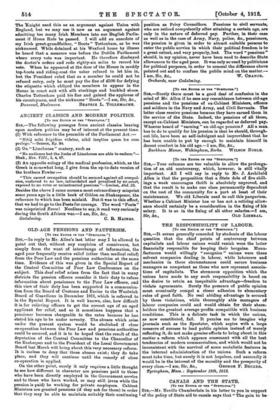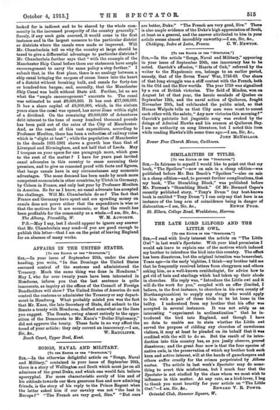CANALS AND THE STATE.
[TO THE Enrroa OF TEE "SPECTATOR."] Six,—Mr. Neville Chamberlain in his letter to you in support of the policy of State aid to canals says that " The gain to be looked for is indirect and to be shared by the whole com- munity in the increased prosperity of the country generally." Surely, if any such gain accrued, it would come in the first instance and in the largest measure to the particular district or districts where the canals were made or improved. Will Mr. Chamberlain tell us why the country at large should be taxed to give a differential advantage to particular districts ? Mr. Chamberlain further says that "with the example of the Manchester Ship Canal before them our statesmen have ample encouragement to carry the same policy a step further." I submit that, in the first place, there is no analogy between a ship canal bringing the cargoes of ocean liners into the heart of a district without breaking bulk, and canals for forty-ton or hundred-ton barges; and, secondly, that the Manchester Ship Canal was built without State aid. Further, let us see what the "ample encouragement" amounts to. The canal was estimated to cost £8,000,000. It has cost £17,000,000. It has a share capital of £8,000,000, which, in the sixteen years since the caml was opened, has never come within sight of a dividend. On the remaining £9,000,000 of debentures debt interest to the tune of many hundred thousand pounds has been paid out of the rates of the City of Manchester. And, as the result of this vast expenditure, according to Professor Moulton, there has been a reduction of railway rates which is "slight at best " ; while the population of Manchester in the decade 1891-1901 shows a growth less than that of Liverpool and Birmingham, and not half that of Leeds. May I trespass on your space for one paragraph more, which goes to the root of the matter ? I have for years past invited canal advocates in this country to cease assuming their premises, and to give us reasoned proof with facts and figures, that barge canals have in any circumstances any economic advantages. The same demand has been made by much more competent economists in other countries, by Ulrich in Germany, by Colson in France, and only last year by Professor Moulton in America. So far as I know, no canal advocate has accepted the challenge. Will Mr. Chamberlain do so ? The fact that France and Germany have spent and are spending money on canals does not prove either that the expenditure is wise or that the motives for it are economic, or that the result has been profitable for the community as a whole.—I am, Sir, &c.,
P.S.—May I say, lest I should appear to ignore any answer that Mr. Chamberlain may send—if you are good enough to publish this letter—that I am on the point of leaving England for an absence of many weeks.



































































 Previous page
Previous page